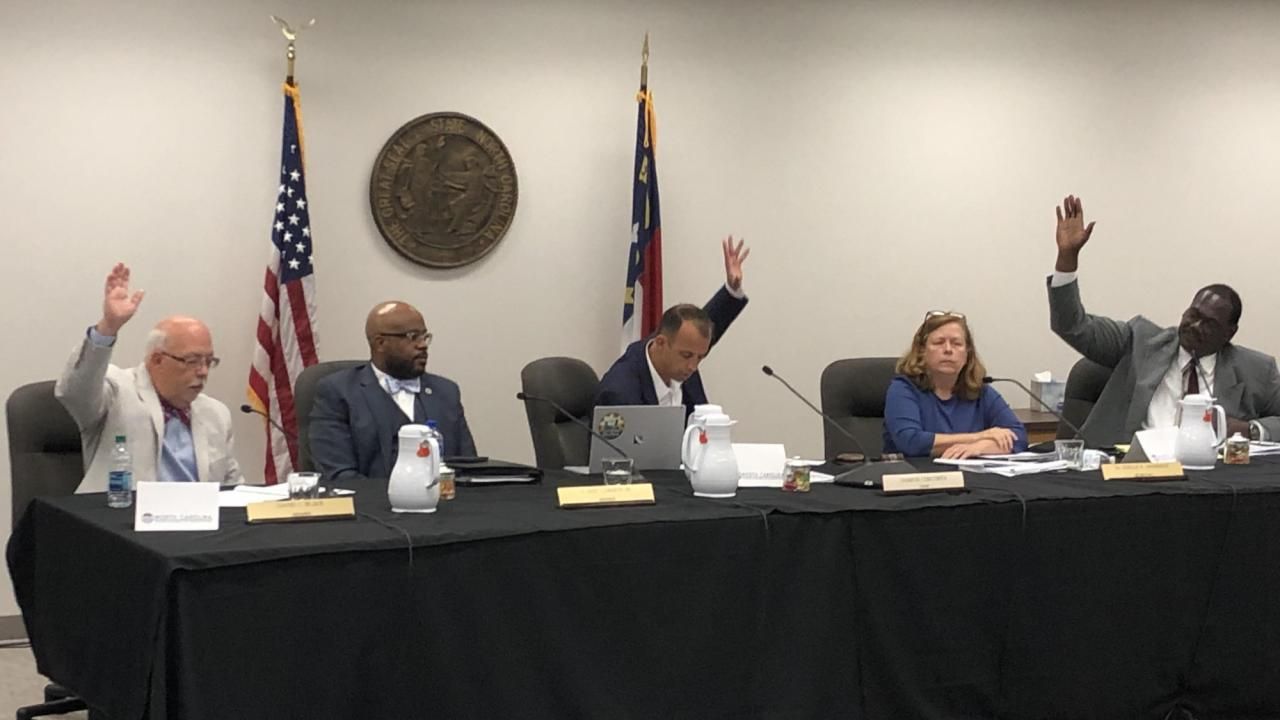NC Board of Elections OKs bar code ballots

The State Board of Elections voted Friday afternoon to certify new voting equipment from three companies, including machines that produce paper bar code ballots that advocates asked the board to reject over security concerns.
The vote followed months of back and forth on the issue and negated a previous board move toward changing state rules to specifically require hand-marked ballots.
New Chairman Damon Circosta cast the the deciding vote, breaking with his fellow Democrats on the board and siding with its two Republicans. The vote was 3-2, and Circosta said after the vote that he had confidence in each of the new systems.
It will be up to county boards of election, some of which must replace touchscreen systems that don't produce a paper ballot, to decide whether to buy and use the machines in future elections. But they must buy from a state-approved list, and Friday's vote added options to that list.
The three systems newly certified are:
- The ClearVote 1.4 system from Clear Ballot
- The ExpressVote touchscreen system from ES&S
- The Verity Voting 2.2 system from Hart InterCivic
With the ES&S system, voters make their choice on a touchscreen, then the machine prints out a ballot, satisfying a paper ballot requirement in state law. The actual vote is recorded in a printed bar code, which is read by another machine.

The other two systems approved Friday use hand-marked ballots, though they have other options for disabled people who can't mark their own ballots. Advocates had pushed the board certify only hand-marked systems, with exceptions for people with disabilities. Among the arguments: People can't verify that the bar code records their actual vote.
"Voters do not like this," board member Stella Anderson said. "Voters do not trust this."
Anderson made a couple of attempts Friday to change state certification rules to require that voters at least have the option of using a hand-marked ballot, but she and fellow Democrat Jeff Carmon were voted down 3-2.
Circosta acknowledged concerns but said he doesn't believe bar codes introduce a new threat, noting that the state already uses electronics in other parts of its voting apparatus, including poll books and paper ballot scanners.
Republican board member Ken Raymond said activists against bar code voting don't seem to have a problem with bar codes in the checkout lines of grocery stores. Carmon responded that people can easily verify the price they paid for groceries.
But even though the ExpressVote ballots list who a person voted for, in plain English, it's the bar code just above that's actually tabulated.
"I cannot look at a bar code and know that that bar code represents my vote," Carmon said.
Lynn Bernstein, one of several local activists who have researched voting systems in use around the country, challenged Circosta and other board members to point to research backing up their confidence in bar code machines.
"He has yet to provide a single resource that says these can't be hacked," Bernstein said after the meeting.
ES&S's Director of Business Development Willie Wesley Jr. said the ExpressVote system is used in 1,200 jurisdictions and that it's the most widely used system on the market.
"It's produced nothing but successful elections," Wesley said.
Wesley described the system as easy for election officials to set up, use and store. Because it prints the ballot when a person votes, election officials don't have to pre-order hundreds of thousands of paper ballots before Election Day. It also avoids confusion by not allowing people to double vote the way they might by filling in two bubbles in a race.
Wesley said people use bar codes to get their prescriptions, at banks, at the Division of Motor Vehicles and in manufacturing operations "where accuracy is of paramount importance."
Siobhan Millen, a precinct judge in Wake County, said the voting machine industry has "over innovated" and that hand-marked ballots are the clear gold standard for security, backed by expert after expert.
"This technology is ripe for error and for hacking, but the voter would be none the wiser," Millen said.
Wake County, and most counties in North Carolina, already use hand-marked paper ballots. But a handful of counties, including Mecklenburg and Guilford, use Direct Record Electronic touchscreen machines, often called DREs.
By law, the counties will have to replace those machines after this year, though pending legislation at the General Assembly would delay that, allowing them to use DREs again in the 2020 elections.
Circosta said Friday that he's "100 percent" in favor of getting rid of the DREs and that he wanted to give local officials "as many options as we possibly can."
Circosta, appointed to the board by Gov Roy Cooper earlier this month, is also executive director at the A.J. Fletcher Foundation, which was started by the founder of Capitol Broadcasting Company. Capitol Broadcasting owns WRAL, and company leadership sits on the foundation board.
In addition to the voting machine options approved Friday, counties can also purchase previously certified equipment with hand-marked ballots. That includes the system Wake County uses, which is also made by ES&S.
Millen said every county in the state ought to do that, but touchscreen systems have proven popular with officials in some counties.
Advocates who packed public hearings before the state board's Friday vote said they'll take their case now to local officials. A lawsuit is also possible as groups, including the state NAACP, try ensure North Carolina voters are able to verify their votes by looking at a hand-marked ballot.









